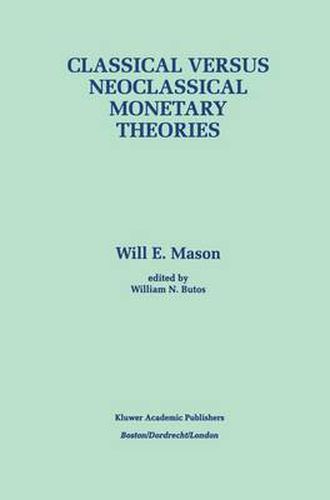Readings Newsletter
Become a Readings Member to make your shopping experience even easier.
Sign in or sign up for free!
You’re not far away from qualifying for FREE standard shipping within Australia
You’ve qualified for FREE standard shipping within Australia
The cart is loading…






This title is printed to order. This book may have been self-published. If so, we cannot guarantee the quality of the content. In the main most books will have gone through the editing process however some may not. We therefore suggest that you be aware of this before ordering this book. If in doubt check either the author or publisher’s details as we are unable to accept any returns unless they are faulty. Please contact us if you have any questions.
Classical Versus Neoclassical Monetary Theories, completed just before Professor Will E. Mason’s untimely death, places recent and mid-20th century monetary theory in a larger historical context, while examining the relevance of contemporary questions in monetary policy. The first half of the volume analyzes the development of the methodological and conceptual foundations of monetary theory, up to and including contemporary mainstream views; the second half addresses more policy-oriented monetary questions. Emphasis is placed on the dichotomy of monetary and value theory, the Walrasian general equilibrium paradigm, the resolution of the “Patinkin controversy’, the Federal Reserve System’s failed experiment with "pure monetarism’, and the misplacement of the free market in the "Chicago paradox’.
Classical Versus Neoclassical Monetary Theories will be of interest both to historians of economic thought and monetary and macro economists, as well as to many well-informed followers and fashioners of monetary policy.
$9.00 standard shipping within Australia
FREE standard shipping within Australia for orders over $100.00
Express & International shipping calculated at checkout
This title is printed to order. This book may have been self-published. If so, we cannot guarantee the quality of the content. In the main most books will have gone through the editing process however some may not. We therefore suggest that you be aware of this before ordering this book. If in doubt check either the author or publisher’s details as we are unable to accept any returns unless they are faulty. Please contact us if you have any questions.
Classical Versus Neoclassical Monetary Theories, completed just before Professor Will E. Mason’s untimely death, places recent and mid-20th century monetary theory in a larger historical context, while examining the relevance of contemporary questions in monetary policy. The first half of the volume analyzes the development of the methodological and conceptual foundations of monetary theory, up to and including contemporary mainstream views; the second half addresses more policy-oriented monetary questions. Emphasis is placed on the dichotomy of monetary and value theory, the Walrasian general equilibrium paradigm, the resolution of the “Patinkin controversy’, the Federal Reserve System’s failed experiment with "pure monetarism’, and the misplacement of the free market in the "Chicago paradox’.
Classical Versus Neoclassical Monetary Theories will be of interest both to historians of economic thought and monetary and macro economists, as well as to many well-informed followers and fashioners of monetary policy.